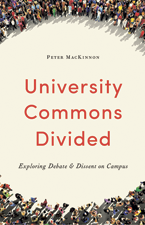
Peter MacKinnon.
University of Toronto Press, 2018; 149 pp;
ISBN: 978-1-48752-282-7.
By Charles Reeve
Peter MacKinnon fears for the university — the agora where, through collaboration and contestation, we learn, discover and advance knowledge. He worries that debate has deteriorated into entrenched parties shouting over each other, with learning and discovery in retreat. And University Commons Divided shows why we should share MacKinnon’s concern: partly through the examples he discusses, but mostly because of his marked inability to himself cross the divide referenced by his title.
If my criticism seems unfair, even glib, two central cases will make the point: those of the University of British Columbia’s Jennifer Berdahl and Carleton University’s Root Gorelick. Berdahl — the Montalbano Professor of Leadership Studies at UBC’s business school — gained notoriety when, following UBC president Arvind Gupta’s abrupt departure, she opined on social media that the board’s ouster of Gupta flowed from racism and outdated notions of masculinity. A phone call from John Montalbano — the board chair and sponsor of Berdahl’s professorship — followed, as did an uproar, an investigation, and Montalbano’s resignation. MacKinnon disparages this conclusion, since the investigation found no violation of academic freedom. But what did Montalbano think would happen when he called Berdahl? Precisely given the prominence of the concerns that motivates — even necessitates — MacKinnon’s book, no other outcome was possible. The optics are too troubling, the stakes too high.
Where Berdahl decried what she saw from outside the board, Gorelick, a botanist at Carleton, disliked what he saw from inside the board: a growing secrecy he felt undid the very sense of common purpose that MacKinnon extolls. Suggesting that Carleton’s board did nothing unusual, MacKinnon instead finds Gorelick naïve: “It should be obvious to any careful observer that Gorelick’s conduct was at odds with precepts of sound board governance, and that his continued membership on the board was untenable,” MacKinnon writes. “But it was not obvious to his union and CAUT, and that may be the most troubling feature in the story of Carleton’s board blogger.” But as Gorelick writes in response, MacKinnon bungled his homework: most universities neither bar journalists from board meetings, nor discourage the university community from attending, nor post police checkpoints at the boardroom door. To use MacKinnon’s words, careful observers anticipated arbitrator Kevin Burkett’s ruling for Gorelick’s academic staff association. All along, Carleton violated acceptable notions of board allegiance.
How MacKinnon got these cases wrong matters: he has extensive, high-level experience in university affairs driven by a passion for post-secondary education, and he’s often right, at a general level. He says near the book’s start, that trust is important and threatened, and near its end that debate, on all fronts, must be encouraged, and he’s right about both and a lot more besides. And similarly for his previous book, University Leadership and Public Policy in the Twenty-first Century, it’s inarguable that universities must account for their embeddedness in public policy. But both books stumble over a conviction that, just as unions and CAUT bedevilled the Root Gorelick saga, they drive all other university ailments. For evidence, MacKinnon cites UBC, Toronto and McGill as three top universities unencumbered by unionized or union-like faculty associations — except that the UBCFA became a union nearly 20 years ago, UTFA is active in both CAUT and OCUFA, and MAUT’s website proclaims its role in founding CAUT. [Unions are his blind spot…]
_________________________
Charles Reeve is an associate professor in the faculties of art and liberal arts and sciences at OCAD University, where he also is president of the OCAD Faculty Association.